RedMagic 7 Review: It’s a Phone All About Speed
Gaming phones like the $629 (£529, roughly AU$930) Nubia RedMagic 7 aren’t trying to compete with Samsung Galaxy devices or Google Pixel phones. They instead crank up the Android gaming experience with specs that sound like they belong in a PC. The RedMagic 7 allows you to max out games for excellent responsiveness and performance.
Features like the 6.8-inch 165Hz refresh rate AMOLED screen, 12GB of RAM and 65W charging speeds also have a benefit beyond just being big numbers. They give us a glimpse at features that will likely make their way over to more mainstream phones in coming years.
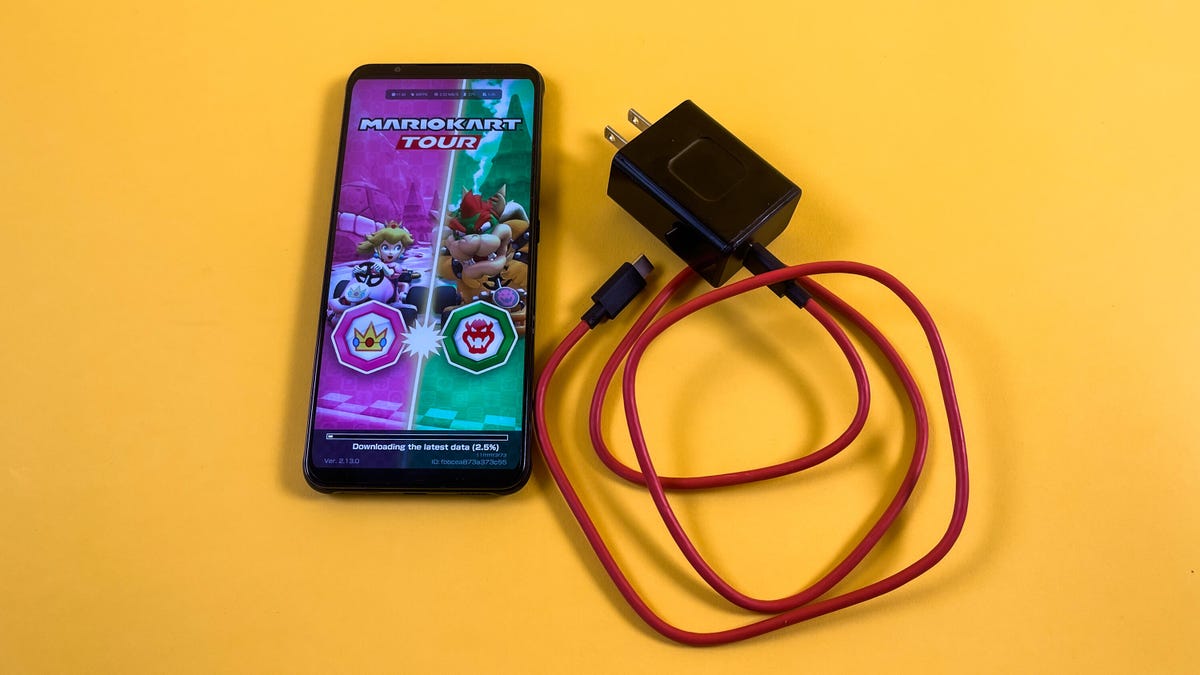
The RedMagic 7 comes with a 65W GaN charger.
Mike Sorrentino/CNET
For the price, all of these features might sound like a steal, but there are plenty of reasons why this phone isn’t for most people, stemming primarily from tweaks to Android 12 that prioritize gaming performance over user experience. The RedMagic also has a shorter software update cycle than other phones at this price. And while a cooling fan is a common feature on many gaming phones, the RedMagic 7 includes an internal one, which is vital to keep the phone from overheating during intensive gameplay.
The RedMagic 7’s $629 starting price includes 128GB of storage and 12GB of memory — the latter already being a ridiculous amount for a phone. The review unit I tested is $799 and has 256GB of storage and an absurd 18GB of RAM. For perspective, the $800 Galaxy S22 has 8GB of RAM.
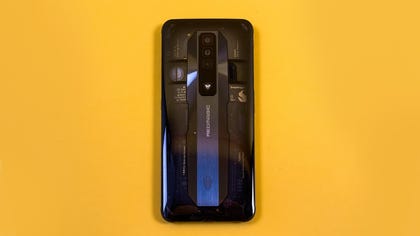
RedMagic 7
Like
- 165Hz refresh rate
- 30-minute charging speed
- Price for the specs
Don’t Like
- Unintuitive Android 12 skin
- Short software update timeline
- Uncompetitive camera for the price range
A little bit Android, a little bit Switch
At first glance, the RedMagic 7 seems like any other Android 12 phone. You unlock it with an in-screen fingerprint sensor and are greeted with a skinned version of Android 12 that includes themed widgets like a switch for the internal cooling fan and a toggle for quickly cranking the display’s refresh rate from 60Hz up to 165Hz.
However, this RedMagic OS customization makes a number of annoying default choices that aren’t great for casual users. Luckily, they can be switched off pretty easily. Apps are organized into multiple home screens like on iOS. To find the app drawer, you have to turn it on in settings. Once you set it up, you can keep most apps there and organize the ones you want onto the home screens.?
The default internet browser is NextWord, which is easy to switch to Chrome or Firefox. And I hope you figure this out faster than I did, but the phone puts a RedMagic watermark on all your photos. After another frustrating trip to Settings I was able to turn that off as well.?
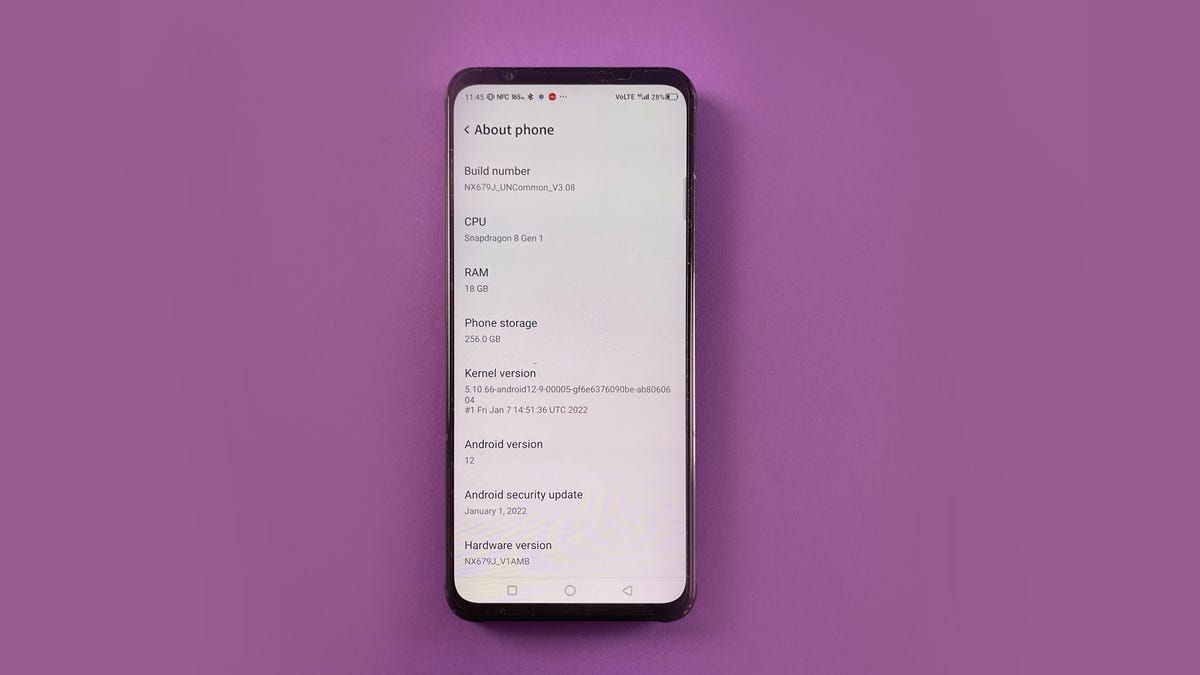
You may find yourself visiting the Settings menu a lot to change some of the defaults in the RedMagic 7.
Mike Sorrentino/CNET
OS annoyances aside, this phone is clearly aimed at gamers. A red physical switch on the top-left of the phone’s transparent body boots it into a game launcher. The aptly named Game Space looks more like the menus you find on the Nintendo Switch and automatically adds games from your app library.
Gaming mode makes several tweaks to the phone’s settings: It disables notifications, turns on the fan and adds menus for quick access to display refresh rates and processor performance. I set it up to show the frames per second as I played which helped determine which games supported higher refresh rates.
On the right side of the phone there’s a fan exhaust and touch-sensitive areas that emulate shoulder buttons on a game controller. You can set up the “buttons” to tap specific areas of the screen during gameplay — for instance I coupled them to the shoot button in Apex Legends Mobile and on the Use and Report buttons in Among Us.
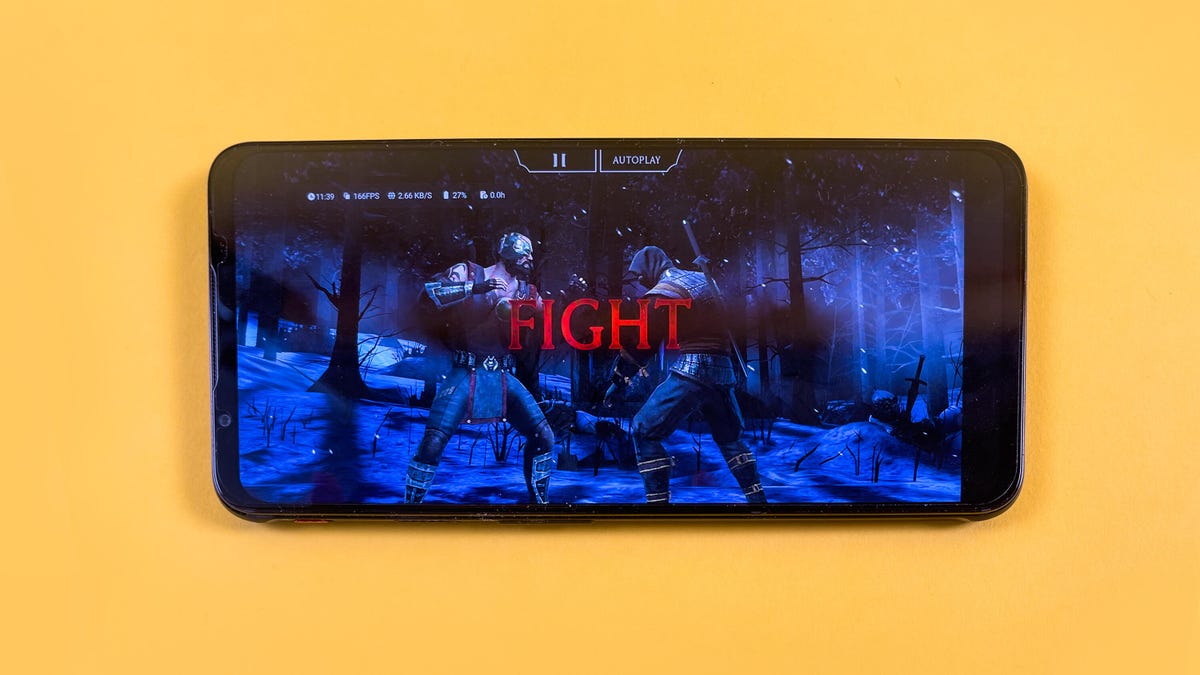
Mortal Kombat Mobile supports the 165Hz refresh rate allowed by the RedMagic 7’s screen.
Mike Sorrentino/CNETGaming runs fast and sometimes hot
Along with the 165Hz display refresh rate, the RedMagic 7 touts a “720Hz Multi-Finger Touch Sampling Rate” — their words. This refers to how responsive screen taps are while playing games. In lieu of having physical buttons, having a cranked-up touch rate for the screen makes a lot of sense. I found it particularly helpful for games streamed from the Stadia cloud service.
Cloud gaming in general is notorious for lag under even the fastest of internet connections, but with the RedMagic’s 720Hz touch rate screen I was almost able to create combos in Mortal Kombat 11. It also made it possible to play Marvel’s Avengers using the touchscreen over the Stadia cloud. These games are made for a physical controller, so while it’s not an ideal or competitive way to play, it works fine for a quick game over good Wi-Fi.
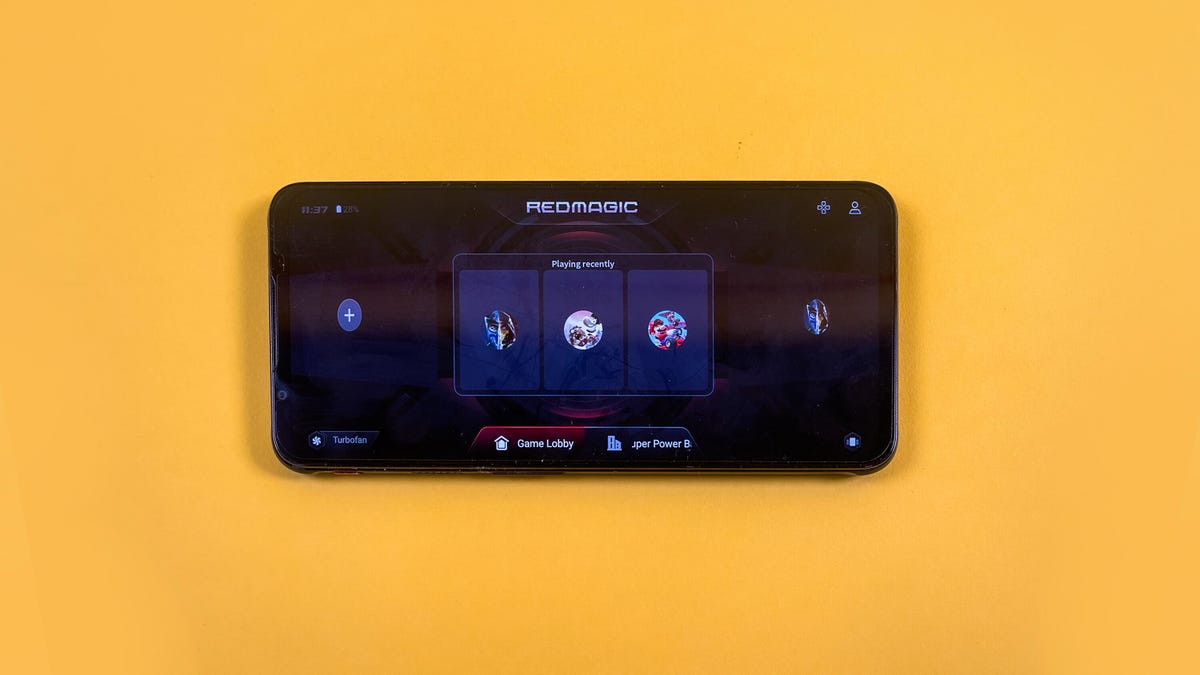
The Game Space launcher on the RedMagic 7, which puts Android games into a more console-like menu.
Mike Sorrentino/CNET
What was more interesting were the handful of games that supported the 165Hz screen refresh rate. Mortal Kombat Mobile (separate from Mortal Kombat 11) cranks all the way up to 165Hz, making all the punches and battles look super smooth. On the other hand, Rayman Adventures, which supports 165Hz, runs at double or triple speed. I had to turn the screen refresh rate down to 60Hz to run at a normal speed.
Most games however ran at 60 frames per second regardless of what I set. While Apex Legends Mobile appeared to top out at 60fps, the game did let me max all of its settings out. Performance remained super smooth throughout my 20-minute match, but I definitely noticed the phone was physically hot to touch. The RedMagic comes with a case that makes the heat from gaming substantially more tolerable.
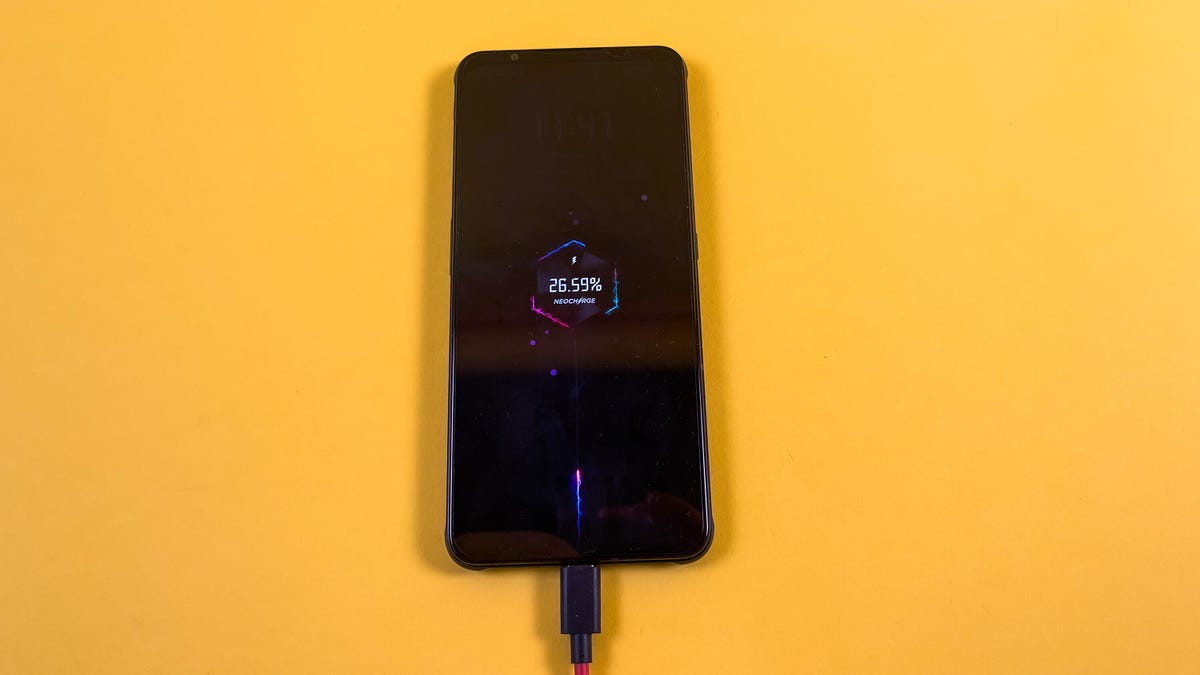
The RedMagic 7 can charge from 0% to 100% in roughly 30 minutes.
Mike Sorrentino/CNETFast charging that I want to see in more phones
The 65W GaN charger that’s included with the phone is a serious perk. The dual 4,500-mAh double-cell battery can recharge from 0% to 98% in just over 30 minutes. This is a phone you definitely won’t need to charge overnight. Interestingly enough when charging, an onscreen graphic shows the percentage, and the cooling fan turns on to dissipate any heat.
Battery life was great: I consistently got through an entire day, even when I kept the screen at 165Hz. Even on days where I played games for an hour or so, I had 20% to 30% left by the evening.
Another neat trick is you can power the phone straight from the power adapter, skipping the battery. This should help the battery ultimately last longer, since when available the phone won’t need to draw power directly from it at all times. And during gaming, this will reduce the amount of heat the phone gives off.
I hope other phones adopt these power-charging features. A 30-minute charging time means the phone can fully charge up while you shower and get dressed in the morning.
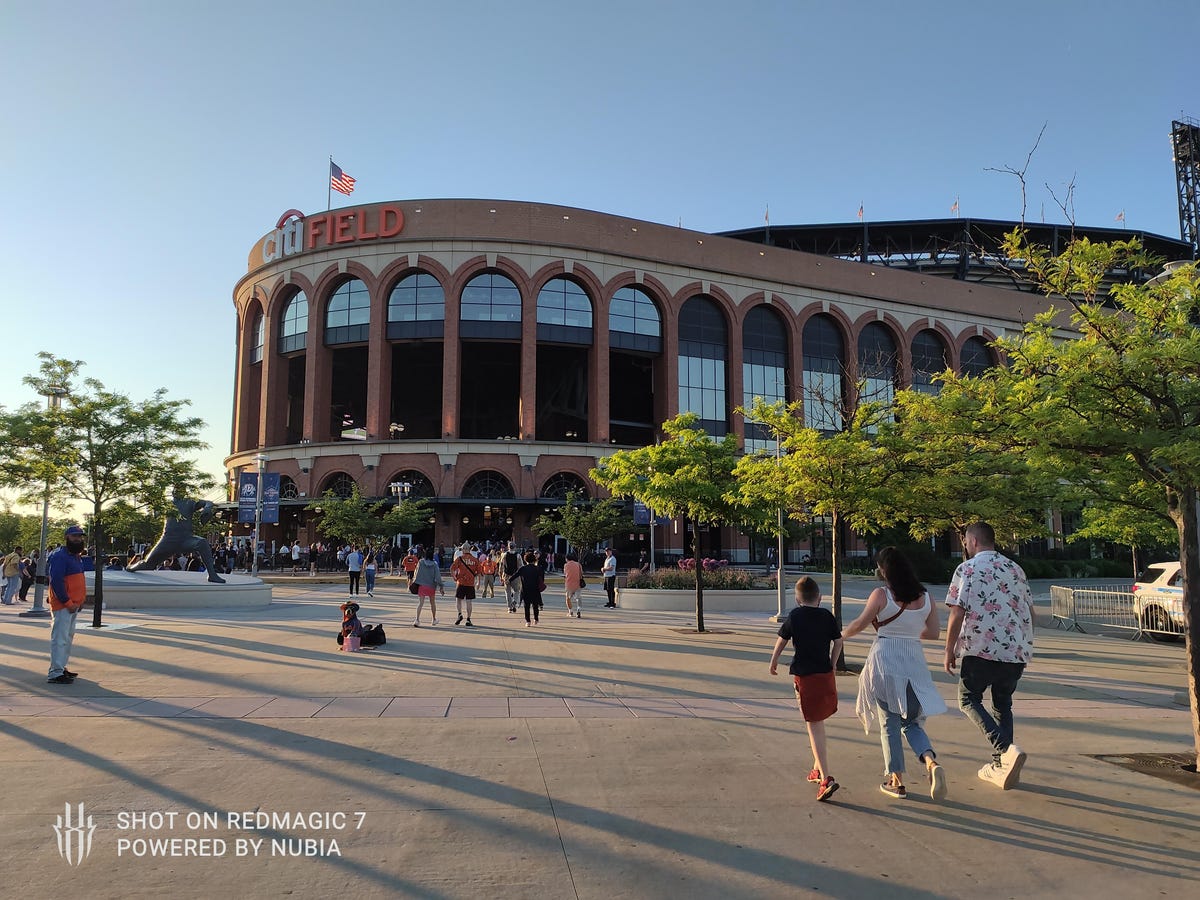
Citi Field in New York. The RedMagic 7 applies a watermark by default that can be turned off in the settings menu.
Mike Sorrentino/CNETPhotography and software support take a back seat
The phone has a 64-megapixel main camera, an 8-megapixel ultrawide camera and 2-megapixel depth sensor. The RedMagic can handle most daytime photography situations, but it isn’t going to win any awards for its photos.
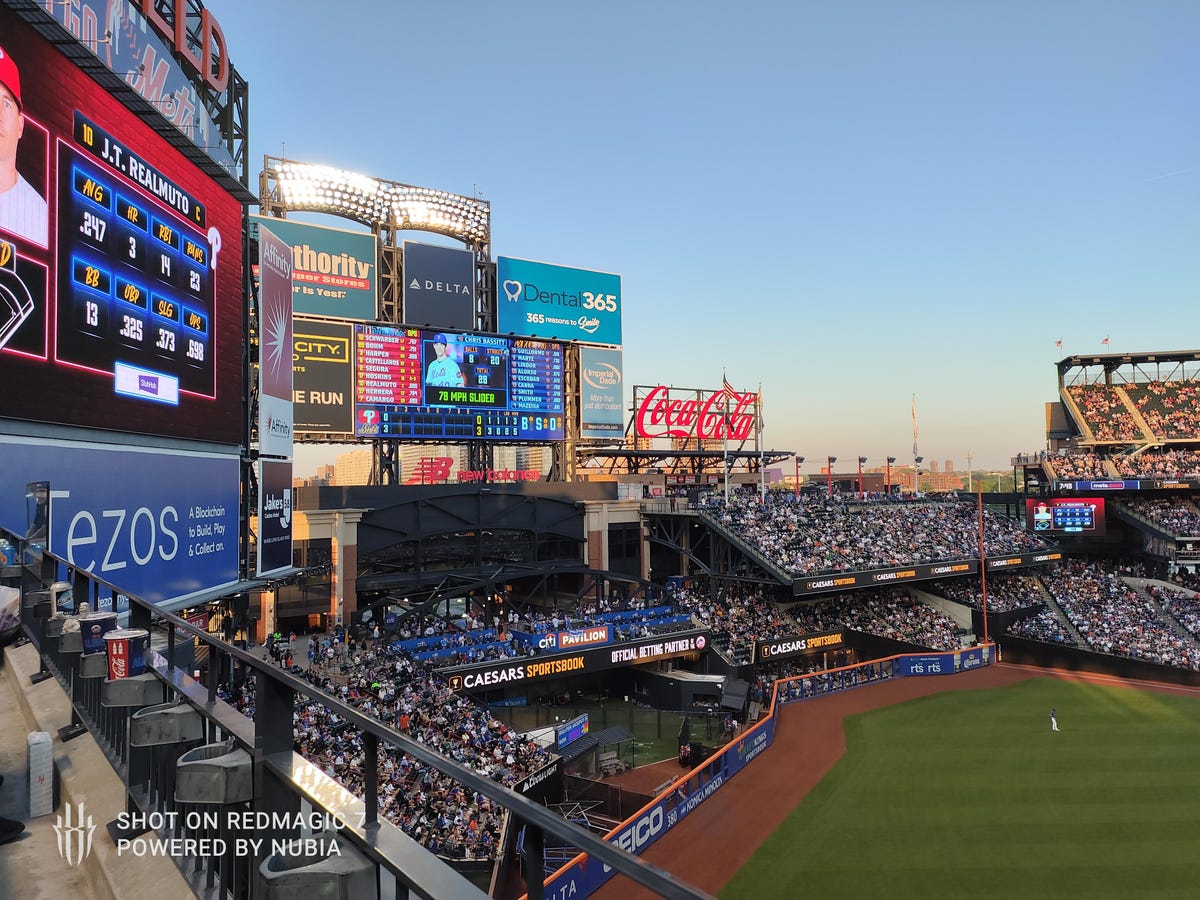
Crowds inside of Citi Field, taken on the RedMagic 7.
Mike Sorrentino/CNET
In terms of image quality, photos I took at a New York Mets game were on par with lower priced phones like the Moto G Stylus 5G. Photos taken outdoors in sunlight generally looked good, while lower light situations were more difficult.?
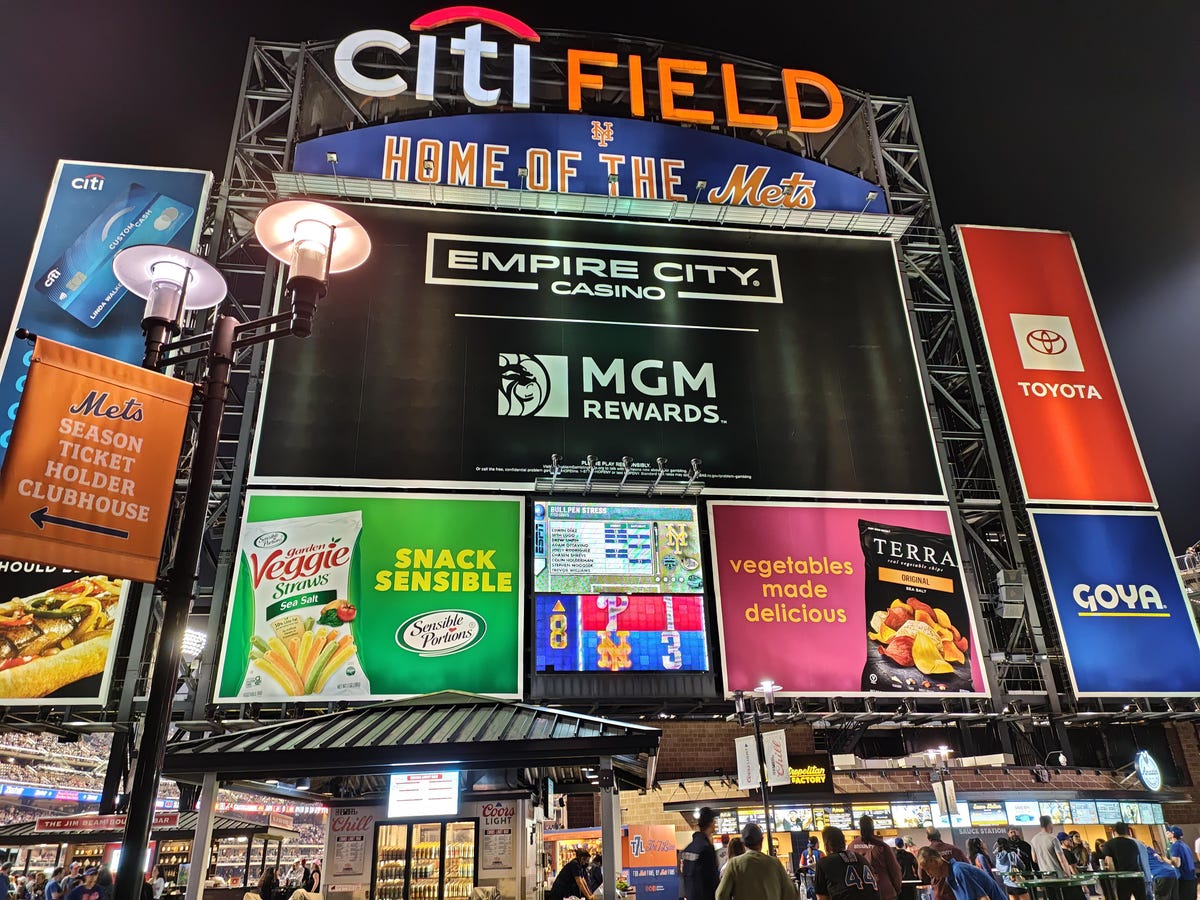
RedMagic 7’s Night mode photo at New York’s Citi Field.
Mike Sorrentino/CNET
The phone’s Night mode helps bring out a few more additional details, focusing on subjects like the signs at the Mets stadium, but it’s not quite as detailed as other phones in this price range. If you want a phone that takes great photos, I recommend looking at the $599 Pixel 6 or the $700 Galaxy S21 FE.

The RedMagic 7 has an 8-megapixel front-facing camera.
Mike Sorrentino/CNET
The 8-megapixel front-facing camera is disappointing, even for livestreaming. Selfie photos are just OK. The front-facing camera isn’t something I’d use to broadcast on Twitch. With gaming and livestreaming so interconnected, it’d be nice if the RedMagic 7 could function as a starter device towards that.
Software support on the RedMagic 7 isn’t great. RedMagic says that its products tend to get one major update with a “maintenance period” that lasts between one and a half to two years.
Geekbench v.5.0 single-core
Nubia RedMagic 7
1,232
Nubia RedMagic 6
1,120
Asus ROG Phone 5 Ultimate
1,125
Note:
Longer bars indicate better performance
Geekbench v.5.0 multicore
Nubia RedMagic 7
3,778
Nubia RedMagic 6
3,716
Asus ROG Phone 5 Ultimate
3,694
Note:
Longer bars indicate better performance
Serious Android gamers only
The RedMagic 7 isn’t for most people, nor is it intended to be. If you are a competitive gamer who really wants an absolutely screaming refresh rate, and doesn’t mind a built-in cooling fan, then this phone is certainly an option for you. Just understand the software update tradeoffs and all the defaults you’ll probably want to change out of the box.
But most other people should look elsewhere for a daily driver phone. Families considering the RedMagic as an alternative to a Switch, would be better off buying a Nintendo Switch and a cheaper phone.
RedMagic 7: A Little Bit Android, A Little Bit Nintendo Switch
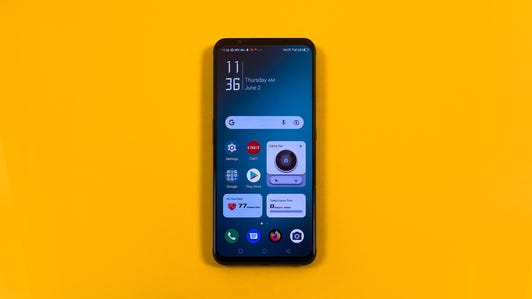
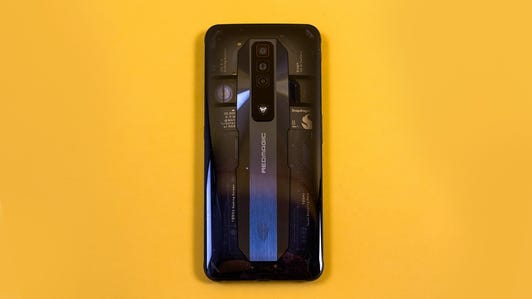
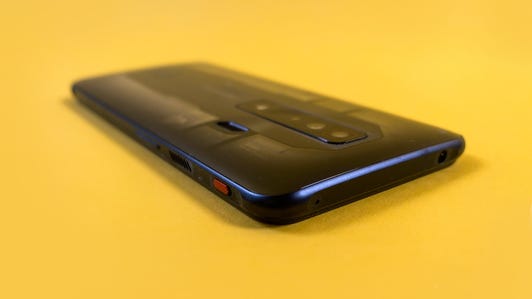
Nubia RedMagic 7 vs. Nubia RedMagic 6 vs. Samsung Galaxy S22 vs. Google Pixel 6
| Nubia RedMagic 7 | Nubia RedMagic 6 | Samsung Galaxy S22 | Google Pixel 6 | |
| Display size, resolution | 6.8-inch FHD+; 2,400×1,080 pixels; 165Hz | 6.8-inches OLED, 2,400×1,080 pixels, 165Hz refresh rate, HDR10, 500Hz single touchrate | 6.1″ AMOLED; FHD+ (1080×2340); 120 Hz | 6.4-inch OLED; 2,400×1,080 pixels; 60 or 90Hz |
| Pixel density | 387ppi | N/A | 425 ppi | 411 ppi |
| Dimensions (Inches) | 6.7 x 3.1 x 0.4 in. | 6.69 x 3.04 x 0.38 in. | 5.7 x 2.8 x 0.3 in. | 6.2 x 2.9 x 0.4 in. |
| Dimensions (Millimeters) | 170.57 x 78.33 x 9.5 mm | 169.86 x 77.19 x 9.7mm | 146 x 70.6 x 7.6 mm | 158.6 x 74.8 x 8.9 mm |
| Weight (Ounces, Grams) | 7.58 oz.; 215g | 7.76 oz.; 220g | 167g (168g for mmWave model) | 7.3 oz.; 207g |
| Mobile software | Android 12 | Android 11 | Android 12 | Android 12 |
| Camera | 64-megapixel (main), 8-megapixel (ultrawide), 2-megapixel (depth) | 64-megapixel (wide), 8-megapixel (ultrawide), 2-megapixel (depth) | 50-megapixel (wide), 12-megapixel (ultra-wide), 10-megapixel (telephoto) | 50-megapixel (wide), 12-megapixel ultrawide |
| Front-facing camera | 8-megapixel | 8-megapixel | 10-megapixel | 8-megapixel |
| Video capture | 8K at 30fps, 4K at 60fps | 8K | 8K at 24 fps | 4K 30, 60fps (rear), 1,080p 30fps (front) |
| Processor | Qualcomm Snapdragon 8 Gen 1 | Qualcomm Snapdragon 888 | Qualcomm Snapdragon 8 Gen 1 | Google Tensor |
| RAM/Storage | 12GB/128GB, 18GB/256GB | 12GB/128GB | 8GB RAM + 128GB 8GB RAM + 256GB | 8GB/128GB, 256GB |
| Expandable storage | No | None | None | No |
| Battery/Charger | 4,500 mAh | 5,050 mAh | 3,700 mAh (25W wired charging) | 4,614 mAh |
| Fingerprint sensor | In-display | In-display | In-display | In-display |
| Connector | USB-C | USB-C | USB-C | USB-C |
| Headphone jack | Yes | Yes | None | No |
| Special features | 720Hz multi-touch sampling rate | 5G-enables, 66W fast charging, 400Hz touch sensitive side buttons, RGB lighting and logo, Game Space hardware switch, Wi-Fi 6E, NFC, dual-SIM | 5G (mmw/Sub6), 120Hz display, IP68 rating, 25W wired charging, 15W wireless charging | 5G sub 6 (some carrier models also have 5G mmWave) support, Wi-Fi 6E, 30W fast charging, Magic Eraser, Motion mode, Real Tone, Face Unblur, Cinematic Pan, 5 years OS and security updates, IP68 rating for dust and water resistance, Gorilla Glass Victus (front), Gorilla Glass 6 (back) |
| Price off-contract (USD) | $629 | $599 | $800 | $599 (128GB) |
| Price (GBP) | £529 | £509 | £769 | £599 |
| Price (AUD) | N/A but converts to AU$930 | Converts to AU$790 | AU$1,149 | AU$999 |